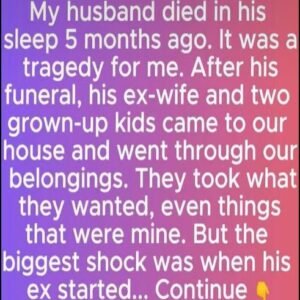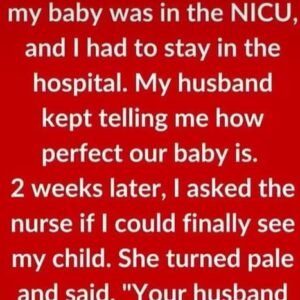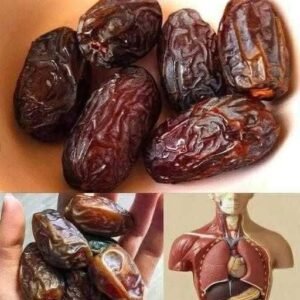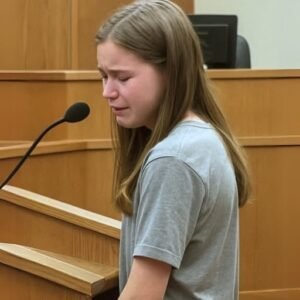At 13, I was so poor, I never had lunch. My stomach would growl so loud it embarrassed me during math class. My clothes always smelled like the tiny one-room shack I shared with my mom. Back then, I never imagined life could get better. I sat alone during lunch, pretending to read library books so no one would see I had nothing to eat.
That’s when I met her—Anara. She was new in class, always quiet but observant. One day, she sat next to me and offered half of her sandwich without saying a word. I refused at first, but she gently placed it on my desk. From that day on, she brought me food every day. She’d slip it into my backpack before lunch or distract others so they wouldn’t see me eating her mom’s homemade rolls.
I didn’t know much about her home life, but I noticed bruises on her arms sometimes. I once asked if she was okay, and she just shrugged, smiling sadly. By December, Anara stopped coming to school altogether. The teacher announced her family had moved overnight. She was just gone.
Years went by. I finished high school with a scholarship. I joined the police academy, determined to help kids like me. By the time I turned 28, I was an investigator with the city police. Life felt stable, but I never forgot Anara’s kindness.
One rainy Tuesday, I was scanning the schedule for upcoming interviews when I saw her name: Anara Vess. It felt like my heart slammed into my ribs. I double-checked the birthdate—it matched. After 15 years of wondering what happened to her, she was going to walk through the doors of the same station where I worked.
When she came in, I froze. She had deep lines on her face that shouldn’t have been there at 28. Her hair was cut short and uneven. Her eyes looked hollow, darting around like she was expecting someone to attack. She wore a faded hoodie pulled tight around her neck.
She recognized me instantly. Her mouth fell open, and she whispered my name like it was a prayer. “Corin?” Her voice cracked. I tried to smile but felt tears prick my eyes. Before I could say anything, my supervisor called me into his office. I was told to sit in on the questioning because she had asked for me specifically.
The lead detective began asking her about a series of robberies. My head spun—Anara was a suspect? She said she needed money for her little brother’s surgery, and an older man she trusted convinced her to help him “collect debts.” She swore she didn’t know he planned to hurt anyone.
My gut twisted. I remembered the girl who shared her lunch with me every day, the one with bruises she never explained. Now, she looked broken, and the world had clearly never been kind to her. I couldn’t help but think: where were the adults who should’ve protected her back then?
She gave every detail honestly, even incriminating herself. She admitted to driving the car during two robberies. She looked at me with tears streaming down her cheeks, apologizing for getting caught up in something so ugly. My boss said she might face serious jail time, especially if the DA decided to make an example of her.
Over the next few days, I couldn’t stop thinking about her. I pulled up every record I could find: her mother had died shortly after they left town, her father was arrested for domestic violence, and Anara ended up in foster care until she aged out at 18. After that, she bounced between jobs and homeless shelters. Her little brother, Joren, had a rare heart condition, and she was all he had left.
It dawned on me how unfair everything had been for her. Despite everything, she had once chosen to feed me when I was the one starving. Now, life had cornered her, and she felt like crime was the only option. I knew she had to face the consequences, but I couldn’t let her carry this alone.
I talked to my supervisor about options. He said if she cooperated fully and helped them arrest the man who masterminded the robberies, she might be able to get a plea deal. It wasn’t guaranteed, but it was a chance. I convinced Anara to tell everything she knew. She hesitated at first, scared of what the man might do, but I promised we’d protect her and her brother.
The day of the sting operation arrived. Anara bravely wore a wire and met the man—Rodric Hallin—at a diner. I watched from a surveillance van, my hands clenched into fists. She played her part perfectly, leading him to brag about the robberies. When officers moved in, Rodric tried to run, but he didn’t get far. They caught him with a gun and thousands in cash.
With his arrest, Anara’s cooperation was undeniable. The DA agreed to a deal that would spare her prison if she completed a strict rehabilitation program and did community service. The relief on her face when we told her was overwhelming. She collapsed into my arms, sobbing so hard I thought she’d never stop.
I drove her home that night, to a tiny apartment she shared with Joren. He was eight, pale and thin, but smiled like the sun when he saw her come in. I remembered that smile—it was the same one she used to give me when handing over a sandwich. Life had hardened Anara, but it hadn’t killed her capacity for love.
I started visiting them regularly, helping with groceries and connecting them with social services. My colleagues and I organized a fundraiser at the station to help pay for Joren’s surgery. By some miracle, the local news caught wind of the story, and donations poured in. The day of the surgery, I sat next to Anara in the hospital waiting room, praying silently.
Hours later, the surgeon emerged with a tired smile: Joren had made it through. Anara sobbed into my shoulder again, this time with tears of joy. She squeezed my hand and whispered, “I don’t know how I can ever repay you.”
I shook my head, remembering those dark middle school days. “You already did. You saved me first.” She smiled through her tears, and I realized that the small kindness she showed a hungry boy had just come full circle. The cycle of pain that had haunted her life finally felt broken.
Months passed. Anara completed her rehabilitation and started working at a local café. She invited me over every week for dinner with Joren, who grew stronger each day. The three of us formed a makeshift family, one that healed old wounds neither of us had asked for.
The police department officially recognized her bravery in helping arrest Rodric. She stood on stage at the city hall, shaking as they handed her a certificate. She gave a short speech about how kindness can ripple across decades, saving lives in unexpected ways. I watched her with pride, remembering the quiet girl with bruises who once sat beside me in class.
One day, sitting at their kitchen table, Anara told me something I never expected: the reason she first started giving me food wasn’t just because I was hungry, but because it distracted her from what was happening at home. Helping me made her feel like she had control over something, like she could make a difference, even when her own life was a nightmare.
That revelation broke me. We cried together that night, realizing how much we had unknowingly supported each other. I promised I’d never let her face anything alone again.
Three years later, Anara finished community college with a degree in social work. She found a job helping at-risk youth—kids like we once were. I sat in the front row at her graduation, tears streaming down my face as she received her diploma. Joren, now 11, cheered louder than anyone.
That night, as we sat on her couch eating homemade pizza, I told her how proud I was. She laughed and nudged me playfully. “You know, I used to think there was no way out. I thought I’d die in some alley or end up in prison forever. But you showed me life can turn around.”
I shook my head. “You saved yourself, Anara. You always had it in you.”
A year later, we got married in a small ceremony at a lakeside park. The same kids Anara mentored threw flower petals as she walked down the aisle. Our old teachers came, including Mr. Bellamy, who told me he’d never seen two people more deserving of a second chance.
Together, we opened a non-profit focused on feeding kids in low-income schools. Every week, we packed lunches with notes of encouragement inside, hoping each one would make a kid feel seen and cared for. Watching Anara hand out those lunches made me realize we’d found our purpose.
Life will never be perfect, but we learned something important: kindness given freely can echo for years, even when you least expect it. A single sandwich shared in a dusty middle school cafeteria led to a future neither of us could have imagined.
If you take anything from our story, let it be this: never underestimate the power of small acts of love. You might think you’re just helping someone through a tough day, but you could be changing the course of their entire life—and yours.
Please like and share this post if it touched your heart. You never know who might need a reminder that kindness can truly change the world.





